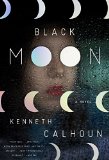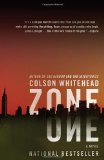Summary | Excerpt | Reviews | Beyond the book | Read-Alikes | Genres & Themes | Author Bio

The popularity of book-turned-movie World War Z and television series The Walking Dead points to a cultural interest in zombies. Kenneth Calhoun's Black Moon builds upon this interest in a haunting and disturbing tale about an insomnia epidemic that turns people into zombie-like monsters.
Cellphone reception has disappeared, electricity is out in many places, and the traditional media has yet to pick up the story, but there appears to be a widening problem: people are discovering that they are unable to fall asleep. As insomnia turns to mania, the afflicted wander the streets babbling incoherently and destroying property. For the most part, these insomniacs are harmless, unless they find a "sleeper," a person who can still sleep. The sight of a sleeper turns the insomniacs into vengeful killers who will stop at nothing to destroy the people who can still sleep. As the mania intensifies, some insomniacs are able to identify sleepers by their straight walking gait and intact syntax. (Insomniacs, themselves, are easily identified by their garbled speech and drunken walk). As the world plunges into darkness - throwing society into turmoil and dividing families - the search for a cure evolves into the quest to discover how to keep a dwindling human race human.
Black Moon follows three characters in varying states of desperation as they battle the insomnia epidemic.
Biggs discovers that he can still sleep, a habit that is becoming increasingly difficult for his marriage. His beloved wife Carolyn has always struggled with insomnia, but this newest iteration of sleeplessness is troubling. As the days pass and she falls further into her sleepless state, it becomes harder for Biggs to stay with her. Afraid to sleep near her because she might kill him while he slumbers, he takes to sleeping under bushes in the park. When he returns from a nap one day to find her gone from their apartment, he begins a search for her. He wonders if in her confused state, she may have wandered home to her father's house, an estate miles away from the city. As he searches through the urban wasteland and into the abandoned countryside, he begins to think about aspects of his marriage and Carolyn that were always mysterious to him. For instance, why did she disappear for six weeks a year ago and offer no explanation? His search for Carolyn takes him through the nightmare landscape created by the insomnia plague, but it also forces him to assess problematic aspects of his life with her.
Lila, a teenager who can still sleep, is experiencing a nightmare herself. Removed from her home by sleepless parents who worried they would kill her, Lila has been separated from the driver who was paid to take her to a safe place for sleepers. Alone and frightened, she wanders through a suburban wasteland in disguise, foraging for food in abandoned kitchens and makes her way west towards the sea in hopes of finding others like herself.
Chase, a college kid pining for his ex-girlfriend Felicia, has teamed up with his friend Jordan to steal sleep medication with the hope of making a lot of money. The fun lasts until Chase falls victim to the epidemic and becomes obsessed with finding Felicia. He abandons Jordan and steals a truck full of sheep to return to Felicia's parents' house in time for her birthday. Meanwhile, she has been holed up in a sleep study center outside San Diego, and believes the specialists she shadows may have found a cure for the epidemic. Felicia returns home to find her parents and bring them to the center. What she finds is devastating.
Black Moon's depiction of an insomnia epidemic is disorienting and convincing. These scenes and the illustration of intriguing characters wrestling with the problems of their frightening world would have been enough to create a fascinating read, but Calhoun takes his novel a step further. Perhaps zombie films and novels are so entertaining because their portrayals of people without humanity actually reveals to us what we prize most about it. Calhoun takes for granted that we value love, family, human connection and makes the additional observation that our real humanizing force is our ability to dream. Dr. Lee, a sleep specialist who appears in the final chapters, suggests that all of human ingenuity, faith, and civilization were presented first in dreams. For the world of the novel, sleeplessness ends humankind not only because it turns people into monstrous killers but also because it steals the ability to dream, to create visions of the future that is better than the present.
Though Calhoun's novel falters in its characterization - the scenes of Chase driving a truck of sheep borders on the ridiculous; Lila's storyline is never satisfyingly concluded - Black Moon shines in its illustration of nightmarish insomnia and edifying dreams. Coleman's portrayal of Biggs' brother and sister-in-law's descent into sleepless insanity is brilliant and chilling. Biggs' dreams about Carolyn are beautiful. Calhoun's language allows us to inhabit the experience of both the insomniacs and the sleepers, giving us the ability to experience the depravity and wonder of both. Though Calhoun's characters sometimes fall short of complete actualization, the depiction of their environment, the terror of sleeplessness, and the hope of dreams never does.
Fans of zombie entertainment will delight in this new take, but even readers who are not partial to zombies will appreciate this haunting investigation of what makes humans human. Calhoun's debut novel is unforgettable.
![]() This review was originally published in The BookBrowse Review in April 2014, and has been updated for the
February 2015 edition.
Click here to go to this issue.
This review was originally published in The BookBrowse Review in April 2014, and has been updated for the
February 2015 edition.
Click here to go to this issue.

If you liked Black Moon, try these:

by Emily Schultz
Published 2016
A hilarious and whipsmart novel where an epidemic of a rabies-like disease is carried only by blonde women, all of whom must go to great lengths to conceal their blondness.

by Colson Whitehead
Published 2012
Both spine chilling and playfully cerebral, Zone One brilliantly subverts the genre's conventions and deconstructs the zombie myth for the twenty-first century.
Your guide toexceptional books
BookBrowse seeks out and recommends the best in contemporary fiction and nonfiction—books that not only engage and entertain but also deepen our understanding of ourselves and the world around us.